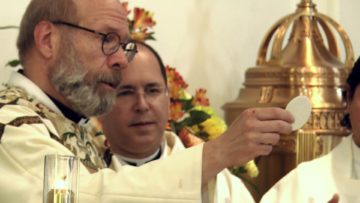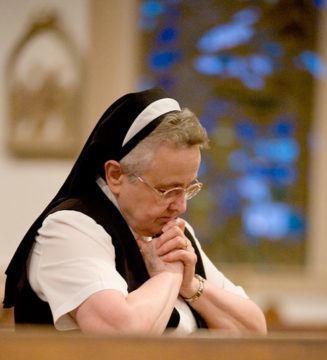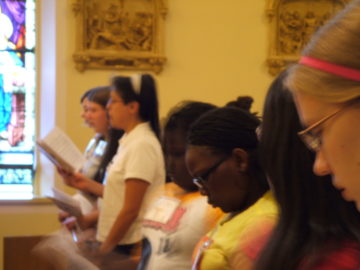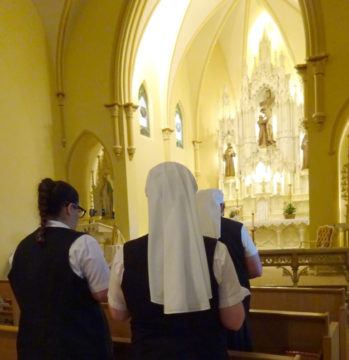Johan van Parys, Ph.D., a native of Belgium is Director of Liturgy and the Sacred Arts at The Basilica of Saint Mary in Minneapolis. He teaches at St. John’s School of Theology and Seminary in Collegeville, MN and is the chair of the MN/ND Patrons of the Arts in the  Vatican Museums. Johan lectures on liturgy, spirituality and the arts throughout the country. In addition to numerous articles in various magazines his book Symbols that Surround Us (Liguori) was published in 2012 and What’s the Smoke for. And other Burning Liturgical Questions (Liturgical Press) was published in 2014. You can read his blog and watch his Art that Surrounds Us on www.Mary.org
Vatican Museums. Johan lectures on liturgy, spirituality and the arts throughout the country. In addition to numerous articles in various magazines his book Symbols that Surround Us (Liguori) was published in 2012 and What’s the Smoke for. And other Burning Liturgical Questions (Liturgical Press) was published in 2014. You can read his blog and watch his Art that Surrounds Us on www.Mary.org
As we are returning to in-person liturgies I wonder if you have ever asked yourself why you participate in the celebration of the Eucharist? Is it maybe out of a sense of obligation? Is it out of guilt or fear? Is it simply out of habit? Is it because someone makes you go? Is it because you think it’s your part of some kind of bargain with God? Or maybe it is because you are moved to celebrate the unfathomable mystery of the Creator of the Universe becoming human so as to show us the path to salvation which passes through the cross?
And if you are like me, when we participate in the Eucharist, sometimes the liturgy really speaks to us and sometimes it does not. There are times when we ar e moved to tears, while other times it may feel like we just go through the motions. Often this has little to do with the liturgy itself but with how we are feeling on any given day.
e moved to tears, while other times it may feel like we just go through the motions. Often this has little to do with the liturgy itself but with how we are feeling on any given day.
Yet, even when the liturgy seems boring and ineffective, as long as we open our heart to the mysterious workings of the Holy Spirit the Eucharist will change us and will mold us more and more into being the Body of Christ to the world. That is the power of the liturgy.
The book o f Deuteronomy (Dt: 4:1-2,6-8) illuminates the evolving relationship between God and God’s people. The Covenant which God made with Abraham was unconditional, based on the profound relationship between God and Abraham. Deuteronomy presents a shift as the covenant between God and Israel becomes bilateral. God offers to uphold the covenant and bless Israel as long as the people hold up their part of the bargain by remaining faithful to the commandments and the Law of Moses.
f Deuteronomy (Dt: 4:1-2,6-8) illuminates the evolving relationship between God and God’s people. The Covenant which God made with Abraham was unconditional, based on the profound relationship between God and Abraham. Deuteronomy presents a shift as the covenant between God and Israel becomes bilateral. God offers to uphold the covenant and bless Israel as long as the people hold up their part of the bargain by remaining faithful to the commandments and the Law of Moses.
This is exactly what Moses affirms. But there is a hidden danger in his emphasis on strict adherence to the law, as the law can become an idol in itself. That is what Jesus points out in the Gospel of Matthew.
The Pharisees take offense at the fact that Jesus’ disciples fail to wash their hands before a meal. Purification of the body in many circumstances and for many reasons was deemed important because this was prescribed in the Law of Moses. It must have been a true shock for the Pharisees to see the disciples of Jesus ignore these prescriptions.
Jesus responds to the Pharisees by challenging the relationship between the law and the covenant. Merely following the letter of the law is not enough, according to Jesus. Much more is needed. The covenant between God and God’s people is not just about what is on the outside; rather it is about what is on the inside. It is not just about washing one’s hands but about the cleanness of heart.
The same holds for us. Our relationship with God is not just about the outside but about what is on the inside. Our celebration of the Eucharist is not just about fulfilling an obligation. It is not just about listening, saying the correct words and engaging in the correct actions. It is about singing God’s praise for the marvelous deeds accomplished in Jesus Christ. It is about opening our heart so we might become more like the one whose sacrifice we celebrate: Jesus, the Christ. It is about becoming more like Christ so we can be Christ to the world.
 Or in the words from the Letter of James: “Being hearers of the word is not enough; we have to be doers of the word.” And according to Psalm 27, it is the one who does justice who “will live in the presence of the Lord.”
Or in the words from the Letter of James: “Being hearers of the word is not enough; we have to be doers of the word.” And according to Psalm 27, it is the one who does justice who “will live in the presence of the Lord.”
So let’s end by returning to my original question: why do we participate in the Eucharist on Sunday? During the Eucharist we are invited to listen to the Word so that we may become doers of the Word. And we are invited to share in the Body of Christ so we may become Christ’s hands, feet and heart to the world. These are two of the many reasons why we are called to participate in the Eucharist every Sunday.


